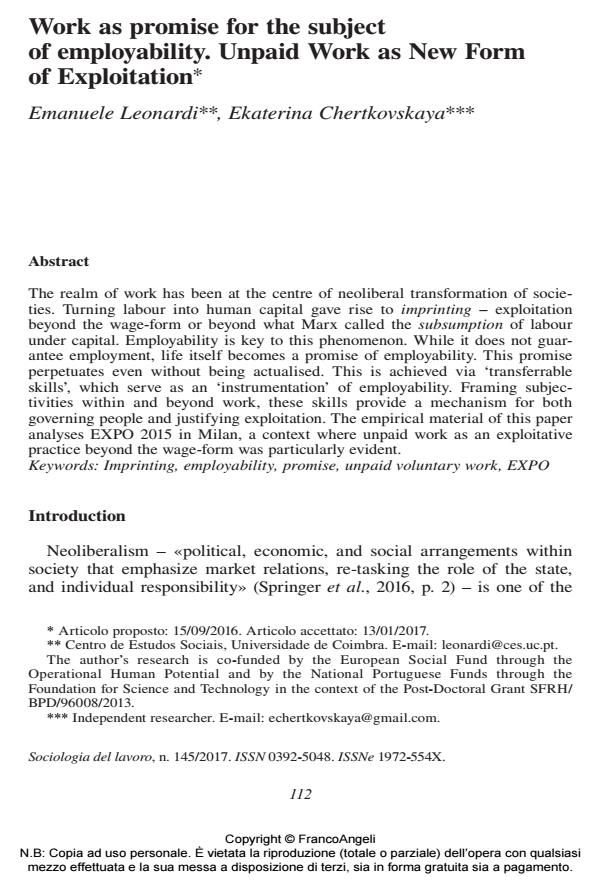Work as promise for the subject of employability. Unpaid Work as New Form of Exploitation
Titolo Rivista SOCIOLOGIA DEL LAVORO
Autori/Curatori Emanuele Leonardi, Ekaterina Chertkovskaya
Anno di pubblicazione 2017 Fascicolo 2017/145
Lingua Inglese Numero pagine 19 P. 112-130 Dimensione file 128 KB
DOI 10.3280/SL2017-145007
Il DOI è il codice a barre della proprietà intellettuale: per saperne di più
clicca qui
Qui sotto puoi vedere in anteprima la prima pagina di questo articolo.
Se questo articolo ti interessa, lo puoi acquistare (e scaricare in formato pdf) seguendo le facili indicazioni per acquistare il download credit. Acquista Download Credits per scaricare questo Articolo in formato PDF

FrancoAngeli è membro della Publishers International Linking Association, Inc (PILA), associazione indipendente e non profit per facilitare (attraverso i servizi tecnologici implementati da CrossRef.org) l’accesso degli studiosi ai contenuti digitali nelle pubblicazioni professionali e scientifiche.
The realm of work has been at the centre of neoliberal transformation of societies. Turning labour into human capital gave rise to imprinting - exploitation beyond the wage-form or beyond what Marx called the subsumption of labour under capital. Employability is key to this phenomenon. While it does not guarantee employment, life itself becomes a promise of employability. This promise perpetuates even without being actualised. This is achieved via ‘transferrable skills’, which serve as an ‘instrumentation’ of employability. Framing subjectivities within and beyond work, these skills provide a mechanism for both governing people and justifying exploitation. The empirical material of this paper analyses EXPO 2015 in Milan, a context where unpaid work as an exploitative practice beyond the wage-form was particularly evident.
Il lavoro è stato trasformato profondamente dal neoliberalismo. La sua mutazio-ne in capitale umano ci permette di ipotizzare l’emergere di una nuova forma di sfruttamento – l’imprinting – oltre la forma-salario e al di là di ciò che Marx chiamava sussunzione del lavoro al capitale. Il discorso dell’employability gioca un ruolo chiave in questo processo. La vita stessa tende a essere percepita come progetto di occupabilità. Ciò si deve alla nuova centralità assunta dalle ‘compe-tenze trasferibili’, che fungono da ‘strumentazione’ dell’occupabilità. Condizio-nando le soggettività sia all’interno che all’esterno del lavoro, tali competenze giu-stificano sia il governo dei soggetti che lo sfruttamento. Il materiale empirico ana-lizzato nell’articolo riguarda l’EXPO milanese (2015), un contesto in cui il lavoro gratuito in quanto forma di employability e pratica di sfruttamento al di là della forma-salario si è dato in maniera particolarmente evidente.
Parole chiave:Imprinting; Occupabilità; Promessa; Lavoro volontario; EXPO 2015
- Uber in the Portuguese gig economy: a laboratory for platform capitalism Emanuele Leonardi, Giorgio Pirina, in Work Organisation, Labour & Globalisation /2020
DOI: 10.13169/workorgalaboglob.14.2.0046 - Employability Tilly South, pp.9 (ISBN:978-1-83708-105-9)
- Making Sense of Exploitation: Teenage Workers’ Experiences of Unpaid Labour in Low-Wage Service Jobs Anna Kallos, in Work, Employment and Society 09500170251380738/2025
DOI: 10.1177/09500170251380738 - Between a Promise and a Salary: Student-Migrant-Workers’ Experiences of Precarious Labour Markets Olivia Maury, in Work, Employment and Society /2020 pp.809
DOI: 10.1177/0950017019887097 - The Palgrave Handbook of Environmental Labour Studies Anna Saave, Barbara Muraca, pp.743 (ISBN:978-3-030-71908-1)
- A Quest for Passion: Understanding Precarious Migration of Young Highly Qualified EU Citizens as Lived Neoliberal Subjectivity Anna Simola, in Sociology /2022 pp.621
DOI: 10.1177/00380385211051224 - An Empirical Study on the Improvement of College Students’ Employability Based on University Factors Yi-Cheng Zhang, Yang Zhang, Xue-li Xiong, Jia-Bao Liu, Rong-Bing Zhai, in Frontiers in Psychology 793492/2022
DOI: 10.3389/fpsyg.2022.793492 - Beyond the Narratives of Experience and Money: The Formation of Teenage Students as Labor in Sweden Anna Kallos, in Critical Sociology 08969205251346899/2025
DOI: 10.1177/08969205251346899
Emanuele Leonardi, Ekaterina Chertkovskaya, Work as promise for the subject of employability. Unpaid Work as New Form of Exploitation in "SOCIOLOGIA DEL LAVORO " 145/2017, pp 112-130, DOI: 10.3280/SL2017-145007